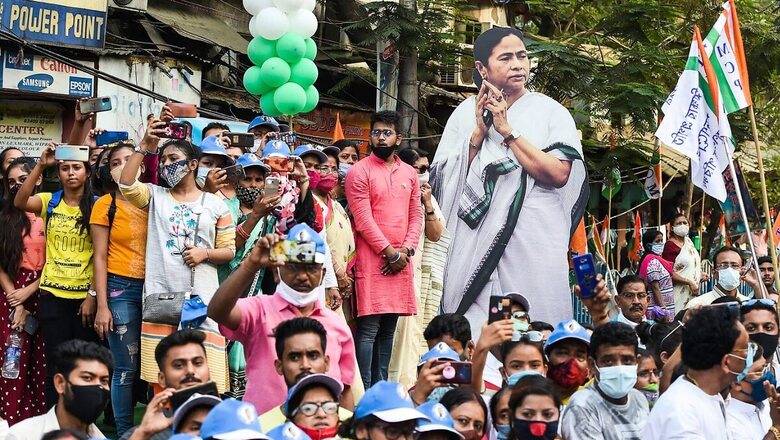
views
Mamata Banerjee emerged triumphant from her existential battle with the BJP, thereby positioning regional forces as the bulwark against the NDA’s creeping hegemony. She is perceived as having not only stopped but rolled back the ‘Hindutva’ bandwagon. The credible victory, in the face of anti-incumbency and a polarized electorate, makes her the new icon of secular liberalism. More importantly, it buoys the regional forces as a whole, with all the attendant implications for Centre-state relations. Non-BJP ruling parties may well seize the opportunity to lobby collectively towards strengthening the operative machinery of federalism.
The BJP’s disappointment is palpable; at this point, it needed a ‘V’ for vindication more than victory, given its virus-battered image. Success in West Bengal would have gone a long way in restoring Brand Modi, frayed by the Centre’s perceived insouciance vis-a-vis the COVID-19 pandemic. Redemption will now involve mammoth efforts; a spate of bold domestic and diplomatic initiatives can be anticipated to offset the global opprobrium.
That said, the Indian electorate showed no signs of the seven-year itch; the NDA, in power at the Centre since 2014, has gained Puducherry and retained Assam. The West Bengal result is a matter of perspective: a big gain over the 2016 Assembly elections or a big loss vis-a-vis the 2019 general elections.
The only question is the BJP’s response to the scale of the defeat: what form will it take and how aggressive will it be? Will it reimagine strategies for West Bengal, where in hindsight, development and employment might well have played better than identity politics, or will it stick with the programme and bide its time?
The Sangh Parivar’s ‘subaltern Hindutva’, perfected in the north, west and central India and exported to West Bengal, has clearly not met with the same level of success. On the other hand, ideological ground was gained even before the results, with the entire campaign fought to the resounding cry of ‘Jai Sri Ram’. The TMC nominees were forced into temple runs and Banerjee herself into a public recitation of the scriptures.
In terms of the RSS-BJP relations, the section of the Sangh Parivar annoyed by the perceived hubris of the Modi-Shah duo will not be entirely disappointed by the outcome. The BJP will now be compelled into a closer coordination with the mother-ship and its cadres, who have suffered through the pandemic as much as anyone. The party will also be under pressure to alter its communications strategy to counter allegations of arrogance and insensitivity, as well as its mode of decision-making, which is seen as being over-centralized of late.
For the Congress, having failed in Kerala and Assam, lost Puducherry and given up on West Bengal, the priority now is to close ranks—and its doors—against an exodus. The danger of the rank and file reading the Assembly election results as a signal to decamp, rather than remain shackled to a dead horse, is very real.
On the plus side, post-West Bengal, the Maharashtra government, of which the Congress is a part, appears more secure. Paradoxically, the party is now more dependent than ever on the Gandhis, who alone can negotiate alliances on favourable terms with regional leaders. The much-delayed election of a Congress president depends entirely on whether Rahul Gandhi is inclined to take the helm of a depleted party.
With regional forces having beaten the national parties to the winning post in three of five states (or four, counting Puducherry), the assembly elections have thrown up important questions for non-BJP chief ministers, Bihar’s Nitish Kumar included, notably that of competitive federalism.
Regional parties have, in the past, been powerful enough to influence governance at the Centre, but that was when they were part of a power-sharing arrangement. In the current scenario, to ensure a stable balance of power between the states and the Centre, collective—but not necessarily oppositional—action is needed.
From that perspective, the victory should be enough for Mamata Banerjee; now it is time to get down to governance. The BJP would do well to offer her an olive branch and she would do well to take it.
Read all the Latest News, Breaking News and Coronavirus News here. Follow us on Facebook, Twitter and Telegram.














Comments
0 comment